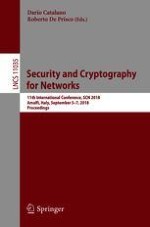2018 | OriginalPaper | Buchkapitel
Lizard: Cut Off the Tail! A Practical Post-quantum Public-Key Encryption from LWE and LWR
verfasst von : Jung Hee Cheon, Duhyeong Kim, Joohee Lee, Yongsoo Song
Erschienen in: Security and Cryptography for Networks
Aktivieren Sie unsere intelligente Suche, um passende Fachinhalte oder Patente zu finden.
Wählen Sie Textabschnitte aus um mit Künstlicher Intelligenz passenden Patente zu finden. powered by
Markieren Sie Textabschnitte, um KI-gestützt weitere passende Inhalte zu finden. powered by
